Overview
Effective communication and interpersonal skills are paramount for successful project stakeholder management. They foster trust, collaboration, and alignment among all participants. This article underscores that implementing effective communication strategies—such as active listening and empathy—is essential for accurately understanding stakeholder needs and enhancing engagement. Consequently, these practices lead to improved project outcomes and higher success rates. Embrace these strategies to elevate your stakeholder management approach.
Introduction
In the realm of project management, stakeholder management is not just a task; it is a pivotal foundation for success. This intricate process requires identifying and analyzing the individuals and groups that can influence a project and engaging them in ways that align their interests with project objectives.
As organizations navigate increasingly complex landscapes, the ability to communicate effectively and foster collaboration with stakeholders becomes paramount. Research shows that projects with robust stakeholder engagement strategies experience significant improvements in success rates, underscoring the critical role of clear communication and interpersonal skills.
Moreover, as technology continues to evolve, project managers must balance human interaction with digital tools to cultivate an environment where feedback and trust flourish, ultimately driving project success.
Understanding Stakeholder Management: The Foundation of Project Success
Stakeholder oversight represents a strategic process encompassing the systematic identification, analysis, and engagement of individuals or groups capable of influencing or being affected by an initiative. This practice is crucial for achieving success, as it ensures alignment among all parties with the initiative's goals and objectives. Effectively managing involved parties necessitates a profound comprehension of each individual's interests, expectations, and influence, which is vital for fostering collaboration and mitigating opposition.
In management, it is recognized that communication and interpersonal skills are essential for successful project stakeholder management, as they are critical for establishing connections, negotiating expectations, and facilitating constructive dialogue among various parties. Studies indicate that initiatives with robust participant engagement strategies are significantly more likely to meet their goals, with success rates increasing by up to 20% when participants are actively involved. Informing sponsors about potential adverse effects and organizing meetings to discuss project goals are essential strategies that enhance participant engagement.
Recent trends in 2025 reveal an increasing reliance on technology to improve participant management processes. While tools such as engagement software are becoming more prevalent, the irreplaceable value of human interaction remains paramount. For instance, case studies illustrate that organizations employing AI technologies, like ChatGPT, have found their influence on participant engagement limited due to the heightened emotional intelligence required in these interactions. This trend underscores the necessity for managers to prioritize human engagement alongside technological solutions.
Furthermore, professional insights emphasize the importance of balancing participant engagement with the need to maintain focus on the endeavor. As Deborah Vogwell asserts, "It is important that managers strike the right balance between involvement from interested parties and isolation of the initiative from external influence in order to achieve delivery on cost and time but also to maximize benefit for the client and his associates." This highlights that communication and interpersonal skills are vital for successful project stakeholder management, enabling project leaders to effectively navigate participant dynamics, ultimately leading to more successful project outcomes.
Moreover, upholding confidentiality regarding sensitive participant information is crucial for establishing trust and nurturing strong connections, further enhancing management efficiency.
The Role of Communication in Stakeholder Engagement
Effective interaction is vital for successful project stakeholder management, where communication and interpersonal skills form the bedrock of participant engagement. This goes beyond mere information exchange; it encompasses active listening and a deep understanding of participant concerns. By fostering clear communication and strong interpersonal skills, managers can build trust, align expectations, and enhance collaboration among participants. This requires articulating objectives, providing regular updates, and maintaining transparency regarding challenges and changes.
When participants feel informed and valued, their likelihood of supporting the project and positively influencing its outcomes increases significantly.
In 2025, the importance of interaction in stakeholder engagement cannot be overstated. Statistics reveal that 61% of participants faced difficulties in viewing presentations during meetings, underscoring the need for effective tools that cater to both remote and on-site teams. The State of the Sector report highlights that emails remain the most widely used broadcast channel within organizations, achieving an effectiveness rate of 89%, while all-employee live events boast an impressive effectiveness rate of 97%.
Moreover, platforms designed to streamline meetings for both remote and on-site teams are essential in addressing these interaction challenges.
Furthermore, the role of interaction in engaging stakeholders is crucial for establishing trust. Management communication expert Nadege Minois observes, "As the changing environment of management continues to develop, one thing remains clear: interaction will remain the foundation upon which successful endeavors are built." This emphasizes the necessity for program managers to implement effective interaction strategies, as communication and interpersonal skills are critical for successful project stakeholder management, to convey information and engage stakeholders meaningfully.
Case studies illustrate the detrimental effects of inadequate interaction within organizations, such as those highlighted in the case study titled 'Real-World Application of Interaction Strategies.' This study emphasizes that effective dialogue begins with leadership and is essential for team alignment. Tools like the DISC assessment can aid organizations in understanding team dynamics, identifying strengths, and pinpointing areas for improvement, ultimately enhancing team performance. By prioritizing effective communication and interpersonal skills, which are vital for successful project stakeholder management, managers can reduce confusion, mitigate mistrust, and cultivate a collaborative environment, thereby safeguarding success.
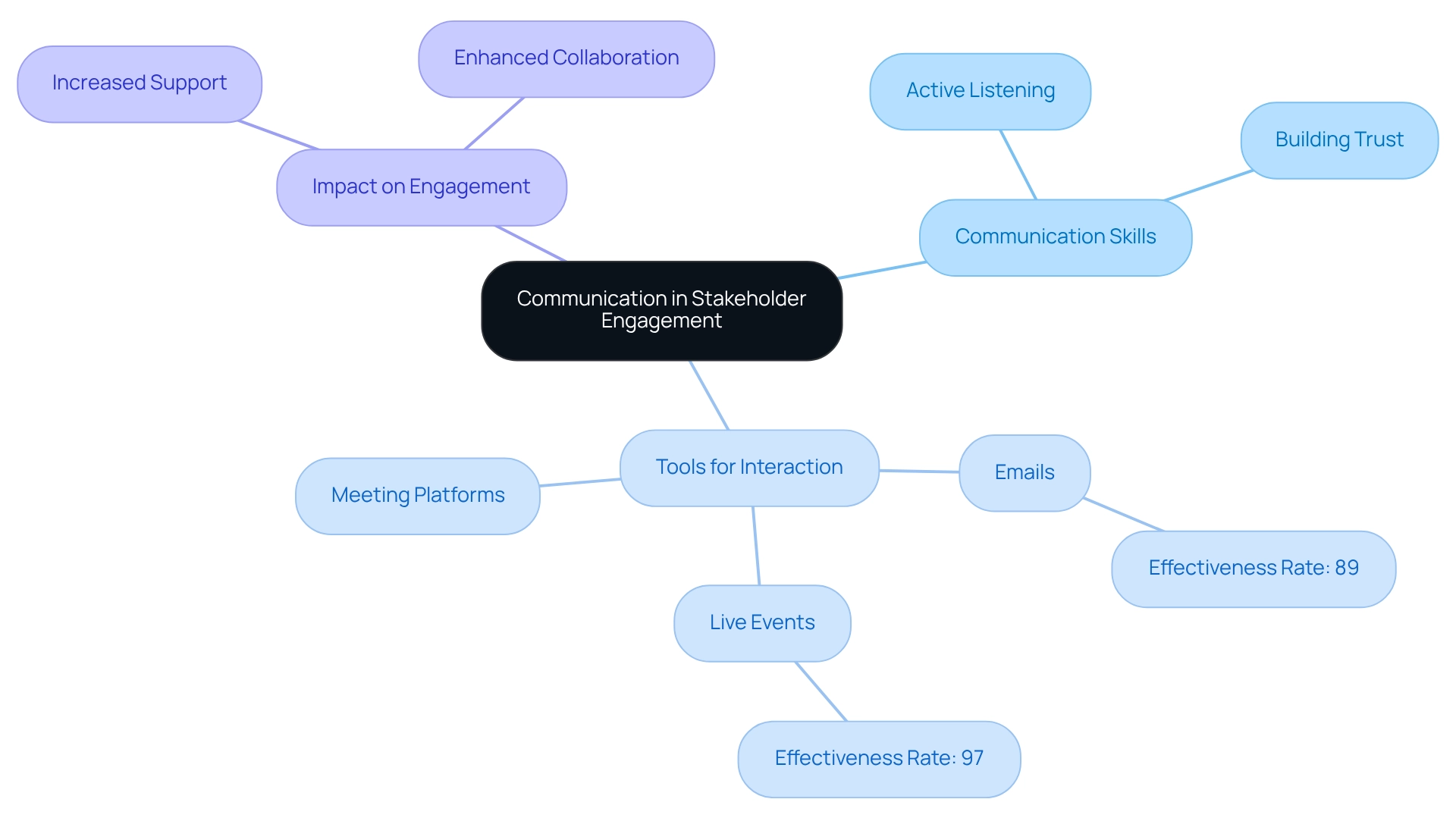
Key Interpersonal Skills for Effective Stakeholder Management
Effective management of interested parties hinges on the recognition that communication and interpersonal skills are paramount for successful project stakeholder management. These skills empower project managers to navigate complex relationships and drive project success. Key skills include:
-
Active Listening: A vital skill for understanding the concerns and feedback of interested parties, active listening fosters rapport and trust. It not only encourages open communication but also ensures that participants feel heard and valued.
-
Empathy: Recognizing and validating the emotions of involved parties is crucial for creating a supportive environment. Empathy enables managers to connect with stakeholders on a personal level, enhancing collaboration and commitment to objectives.
-
Negotiation: The ability to find common ground and resolve conflicts is essential for maintaining positive relationships. Effective negotiation skills allow managers to address differing perspectives and achieve mutually beneficial agreements, particularly in high-stakes endeavors.
-
Adaptability: Flexibility in interaction styles and methods is essential to meet the varied requirements of interested parties. Adaptive managers can tailor their interactions to the distinct preferences and expectations of each participant, promoting smoother collaboration.
-
Influencing: Persuading stakeholders to support initiatives requires robust communication and interpersonal skills. The capacity to influence effectively underscores the importance of these skills in project stakeholder management, leading to increased buy-in and support for objectives, ultimately contributing to success.
Statistics reveal a stark reality: only 34% of underperforming organizations provide training in these essential skills, underscoring a significant gap in development opportunities. This gap highlights the urgent need for organizations to invest in interpersonal skills training to enhance effectiveness in managing initiatives. A recent survey of professionals in the field identified a shortage of resources (44%) and unrealistic deadlines (31%) as primary challenges, emphasizing the necessity for strong interpersonal skills to navigate these hurdles effectively.
Expert opinions reinforce the assertion that communication and interpersonal skills are vital for successful project stakeholder management, particularly emotional leadership skills, in overseeing initiatives. Riaz Ahmed notes, "the significance of abilities and skills related to the emotional leadership competencies has been addressed in literature on initiatives." A study on interpersonal skills as a mediator in success identified a strong positive correlation between the interpersonal abilities of managers and key success factors such as cost control and scheduling.
This reinforces the notion that effective management of interested parties necessitates not only technical expertise but also a strong emphasis on communication and interpersonal skills for successful project stakeholder management.
As we look to 2025, the importance of these essential interpersonal abilities continues to expand, as managers face increasingly intricate participant environments. By honing these skills, managers can enhance their efficiency and achieve successful outcomes.
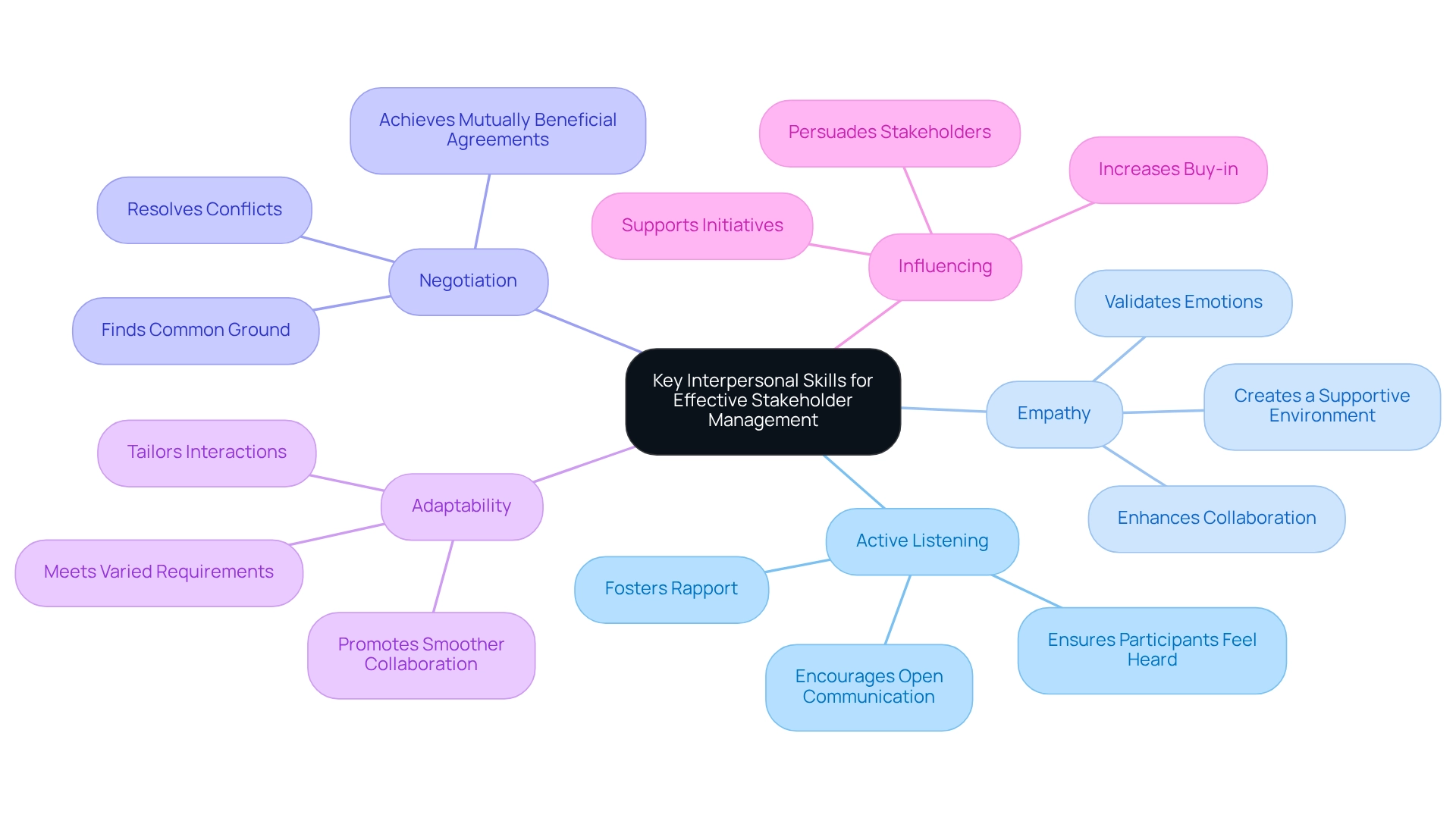
Identifying Stakeholder Needs: A Critical Step in Communication
Recognizing the requirements of interested parties underscores the significance of communication and interpersonal skills for effective project stakeholder management. This process incorporates several key methods:
-
Stakeholder Assessment: By mapping participants according to their influence and interest in the initiative, managers can prioritize engagement efforts effectively. This strategic alignment is vital, as studies indicate that 44% of initiatives fail due to misalignment between business and initiative objectives.
-
Surveys and Interviews: Engaging participants directly through surveys and interviews allows managers to gather valuable insights into their needs and expectations. This method not only fosters trust but can also lead to a 10% improvement in employee retention, particularly in the tech industry, highlighting the importance of participant involvement.
-
Feedback Mechanisms: Establishing robust channels for continuous feedback enables participants to voice their concerns and suggestions throughout the initiative's lifecycle. This ongoing dialogue is essential for adapting to evolving requirements and ensuring success. Metrics such as interaction quality, task completion rate, and participant satisfaction are crucial for evaluating engagement ROI, emphasizing the importance of effective communication and feedback systems.
Grasping the needs of interested parties empowers managers to customize their communication strategies. This approach not only tackles specific issues but also enhances satisfaction among stakeholders. The inclusion of input from interested parties is not merely beneficial; it is critical for achieving alignment and overall success. As highlighted by the Project Leadership Institute, "the initiative leadership team must oversee and then shape those [interested parties'] expectations to ensure a successful endeavor."
Integrating these practices not only improves outcomes but also fosters a collaborative environment where participant needs are recognized and addressed. A case study titled "Balancing Interests Across Different Methodologies" illustrates the importance of adaptability in hybrid management approaches, stressing the necessity for regular interest evaluation and clear communication. Ultimately, these efforts culminate in more successful execution of the initiative.
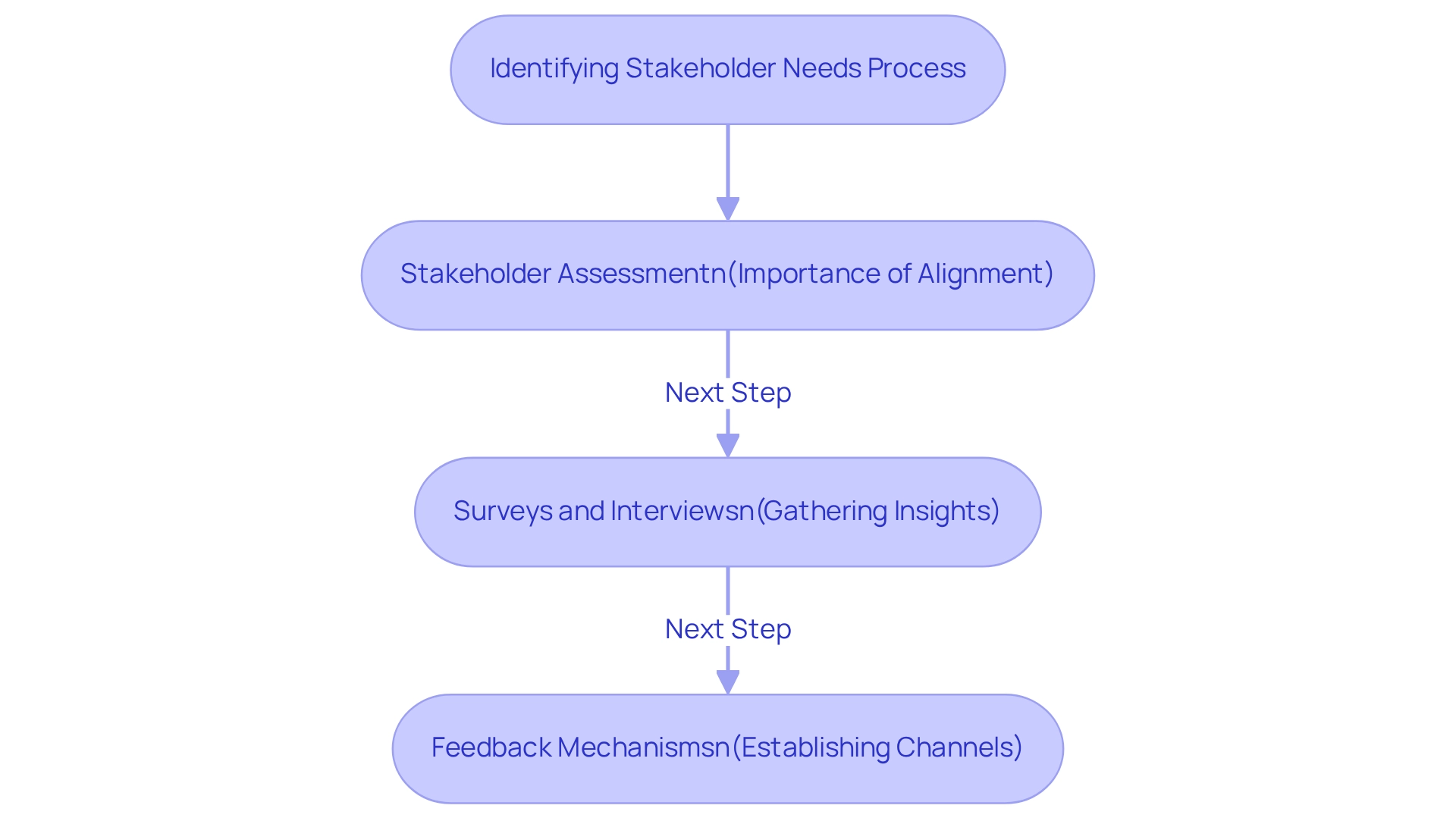
The Importance of Feedback in Stakeholder Communication
Feedback is a vital component of effective participant communication, serving multiple critical functions.
Continuous Improvement: Regular feedback systems are crucial in identifying areas for enhancement in execution and engagement strategies. This iterative process not only enhances results but also corresponds with the 91% of professionals in this field who report encountering challenges in this area. This statistic highlights the importance of proactive feedback systems to tackle these issues.
Building Trust: Valuing and acting upon participant input fosters a collaborative environment. When participants view their contributions as important, it fosters trust, which is essential for effective management. This trust is further strengthened by expert insights suggesting that communication and interpersonal skills are important for successful project stakeholder management, as they can improve relationships and success in endeavors. Moreover, the correlation between appreciation and motivation is evident; a case study revealed that 69% of employees would exert more effort if their contributions were recognized, underscoring the importance of acknowledgment in building trust.
Feedback plays a crucial role in ensuring that communication and interpersonal skills are important for successful project stakeholder management, helping to align expectations from interested parties with objectives. This alignment reduces the risk of misunderstandings and miscommunications, which can impede progress. Causal attributions for incidents, based on internal and external factors related to performance, further illustrate how feedback influences outcomes and perceptions of involved parties.
Implementing structured feedback mechanisms—such as surveys, focus groups, and regular check-ins—can significantly enhance relationships with involved parties. By integrating feedback into project management practices, organizations can not only improve performance but also foster a culture of continuous improvement and collaboration. As highlighted by Reviewer #2, the importance of feedback in organizational psychology emphasizes its essential function in engaging with interested parties.
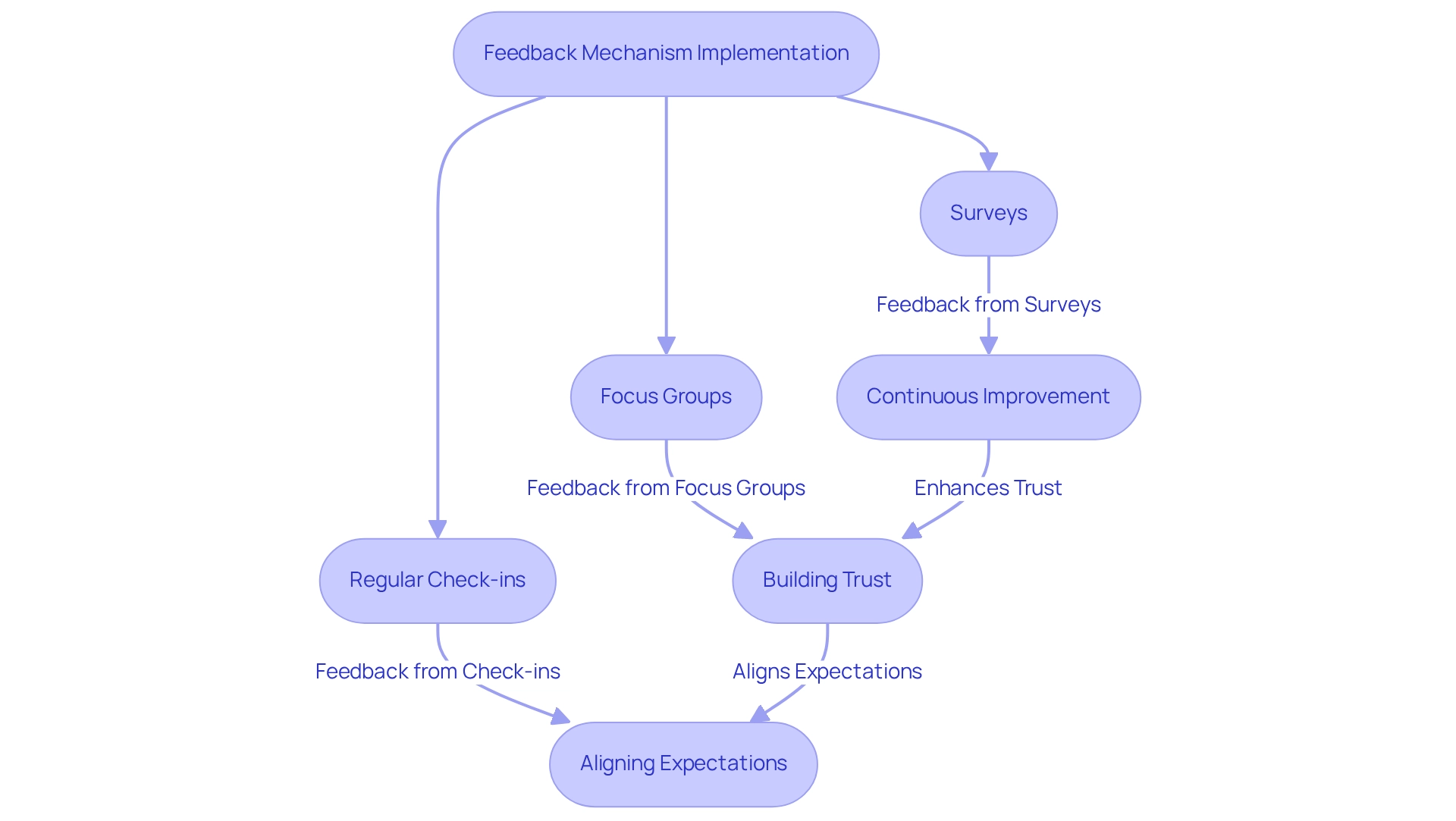
Best Practices for Effective Stakeholder Communication
To ensure effective stakeholder communication, it is essential to adopt the following best practices:
-
Establish Clear Objectives: Clearly define the goals of your messaging efforts. This clarity aids in aligning interests and ensures that everyone is on the same page regarding outcomes.
-
Choose Appropriate Channels: Select communication methods that align with your audience's preferences. Whether through emails, face-to-face meetings, or detailed reports, the right channel can significantly enhance engagement and understanding.
-
Maintain Regular Updates: Keeping interested parties informed about progress, challenges, and changes is crucial. Frequent updates not only promote transparency but also enhance the confidence of involved parties. Indeed, organizations with efficient participant strategies are 40% more likely to finish tasks punctually and within financial limits, underscoring the importance of communication and interpersonal skills for successful project stakeholder management.
-
Encourage Two-Way Communication: Facilitate opportunities for stakeholders to provide feedback and ask questions. This interactive method not only enhances relationships but also enables the identification of potential issues early in the lifecycle.
-
Document Communication: Maintain thorough records of all communications. This documentation acts as a useful resource for monitoring participant interactions and choices, ensuring responsibility and transparency throughout the initiative.
By applying these best practices, organizations can enhance their communication and interpersonal skills, which are essential for successful project stakeholder management. This, in turn, boosts engagement with interested parties, resulting in better outcomes and lasting success. The significance of efficient participant involvement is highlighted by case studies demonstrating that companies thriving in this field enjoy higher sales, loyalty, and improved risk handling. As one expert noted, "This shows how targeted efforts can lead to success."
Therefore, emphasizing interaction tactics is not only advantageous but crucial for achieving success.
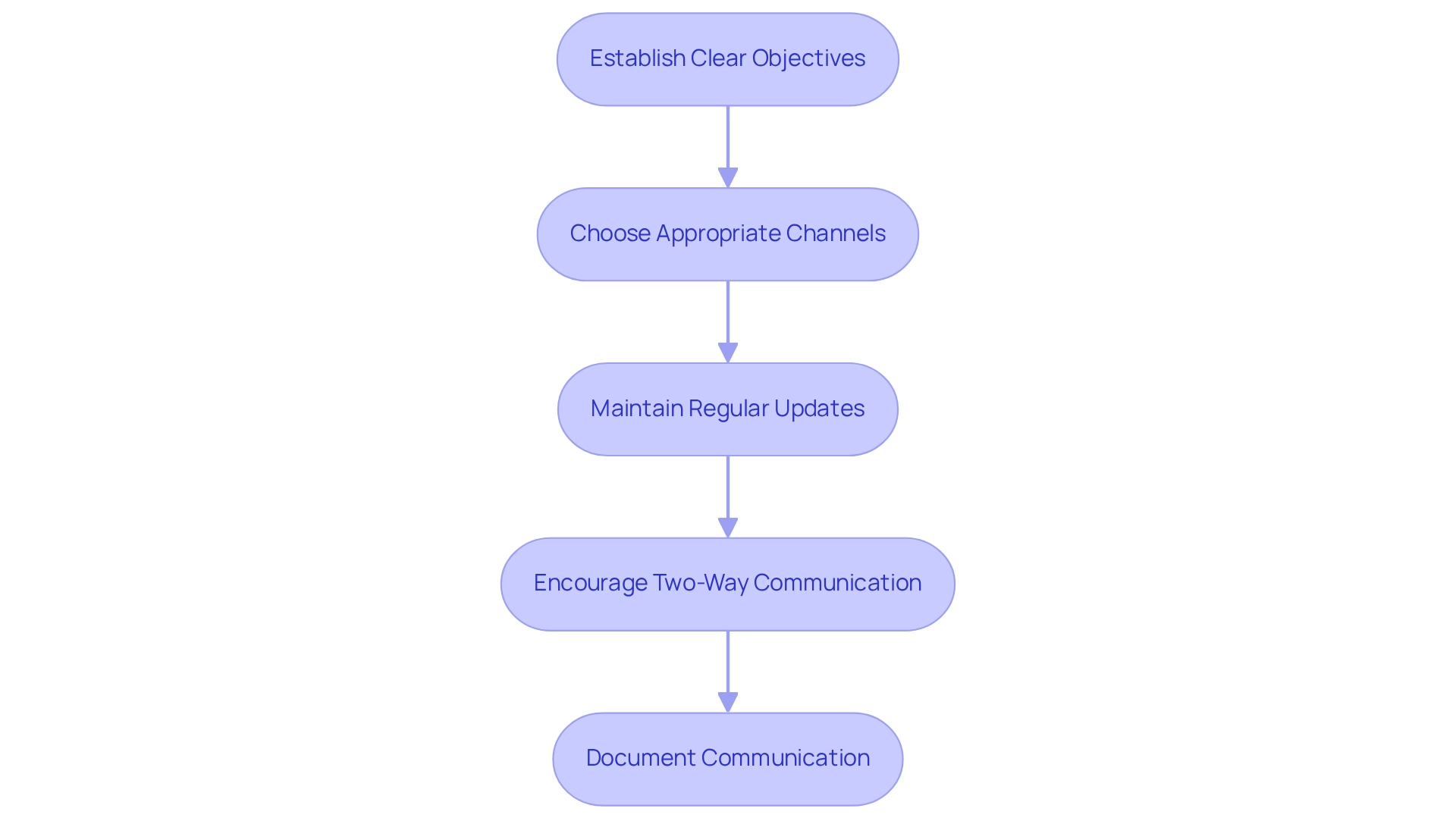
Overcoming Communication Challenges in Stakeholder Management
Effective project stakeholder management hinges on the importance of communication and interpersonal skills, as various obstacles can impede project success. Key issues include:
-
Misalignment of Expectations: Stakeholders frequently harbor differing expectations, leading to confusion and conflict. Establishing clear dialogue from the outset and regularly revisiting these expectations underscores the significance of communication and interpersonal skills for successful project stakeholder management, significantly reducing misunderstandings.
-
Cultural Differences: Diverse backgrounds among stakeholders can result in misinterpretations. Fostering cultural awareness and adjusting interaction styles accordingly are essential, as communication and interpersonal skills are crucial for successful project stakeholder management. Studies indicate that organizations prioritizing cultural awareness in their strategies experience enhanced collaboration and results. Language training can further improve employees' linguistic and communication skills, vital for engaging in international markets.
-
Information Overload: Stakeholders may feel overwhelmed when inundated with excessive information. Managers should concentrate on providing brief and pertinent updates that highlight essential points, ensuring participants remain informed without feeling overwhelmed.
-
Resistance to Change: Change often meets opposition from involved parties, hindering project progress. Involving stakeholders early in the process and addressing their concerns can facilitate smoother transitions and cultivate a sense of ownership.
Statistics reveal that 86% of employees attribute workplace failures to poor information exchange, emphasizing the necessity for robust engagement strategies. Furthermore, organizations with strong employee engagement outperform those with poor engagement by as much as 202%, reinforcing that communication and interpersonal skills are vital for successful project stakeholder management and overall performance. Notably, 69% of workers indicated they would exert more effort if they felt more valued, suggesting that acknowledgment is key to enhancing involvement and boosting communication.
A case study linking employee involvement and performance demonstrates that organizations investing in engagement strategies can achieve significant improvements in task results. By actively addressing these interaction challenges, managers can enhance participant engagement and foster a more cooperative atmosphere, ultimately leading to favorable outcomes.
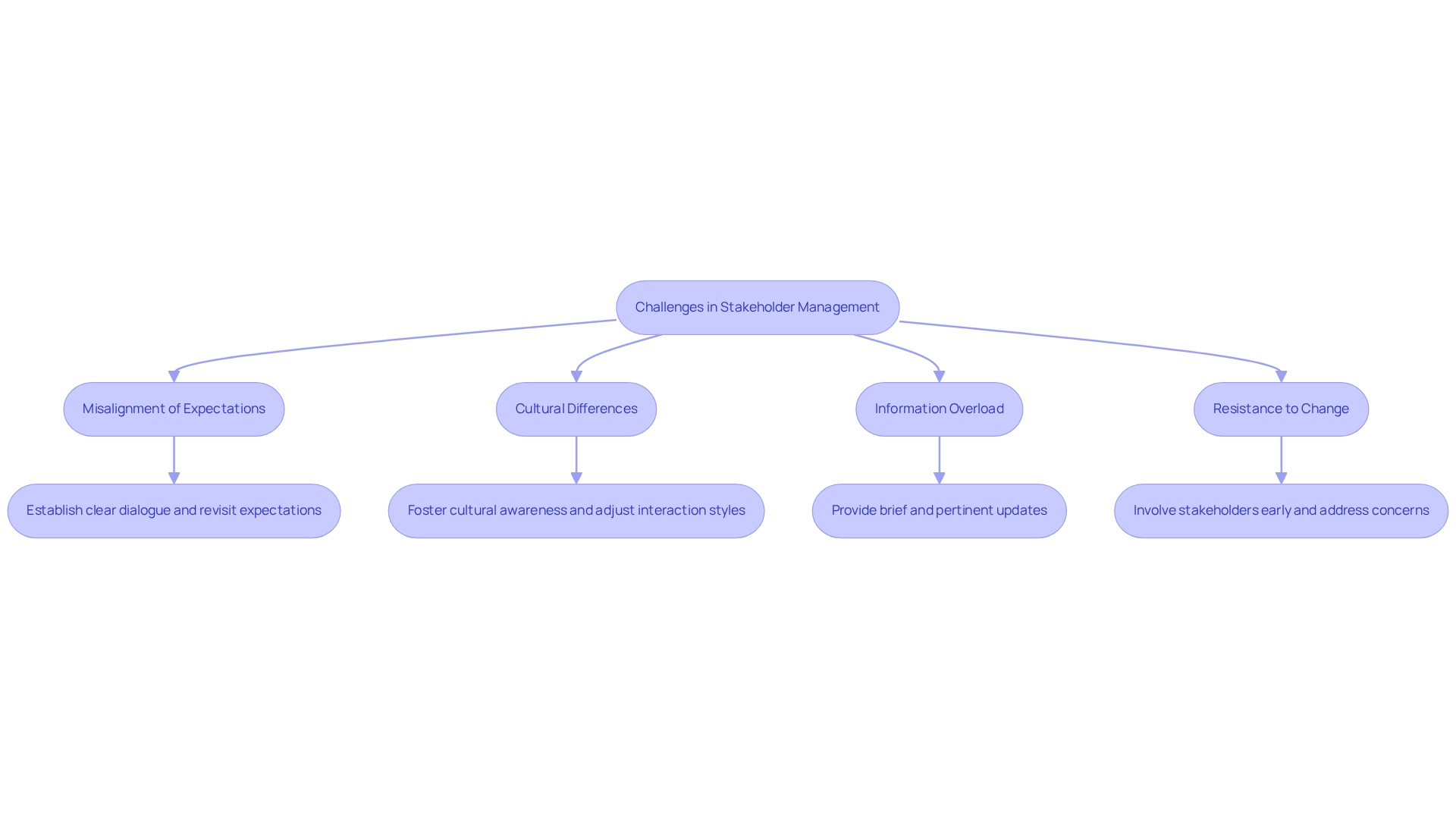
The Impact of Communication on Stakeholder Success
Effective communication and interpersonal skills are crucial for successful project stakeholder management, forming the bedrock of trust, collaboration, and alignment among all participants. These elements are not merely advantageous; they are essential for achieving superior results. By actively understanding participant needs and providing consistent input, managers can adeptly navigate the complexities of participant environments, significantly enhancing the likelihood of success.
Statistics indicate that 75% of employees are more likely to trust their company leadership when they observe meaningful actions taken based on feedback. This trust is vital in fostering a collaborative atmosphere where participants feel valued and engaged. Furthermore, expert insights underscore that interaction acts as a catalyst for success in initiatives.
As noted, "the function of interaction is recognized as a catalyst for the success of the initiative, thus its management as a strategic instrument among participants at all levels of an endeavor should be taken into account which can lead to potential achievements."
The impact of efficient dialogue on task achievement is particularly evident in 2025, as organizations increasingly recognize the need for structured information exchange and timely updates. Successful interaction relies on these components to ensure that all parties are informed and synchronized throughout the project lifecycle. For example, a case study on the implementation of digital signage communication demonstrates how continuous updates and relevant information can significantly boost productivity across departments.
By minimizing dependence on emails and briefings, organizations cultivate a culture of accountability, ensuring that employees remain informed about critical metrics and deadlines.
Moreover, strong interpersonal skills play a pivotal role in strengthening relationships with stakeholders. These skills empower project managers to build rapport, address concerns proactively, and promote open dialogue, which is essential for sustaining engagement with stakeholders. Initiatives that have effectively leveraged interaction with involved parties often report improved outcomes, illustrating that the ability to convey messages clearly and empathetically can yield transformative effects.
Looking ahead, future studies should explore the barriers to implementing effective interaction strategies and assess results using larger samples across various organizations and countries. In summary, communication and interpersonal skills are vital for successful project stakeholder management, as they play a fundamental role in the interplay between effective communication and interpersonal abilities. By prioritizing these elements, organizations can not only achieve their project objectives but also foster enduring relationships with stakeholders, ultimately driving sustainable growth.
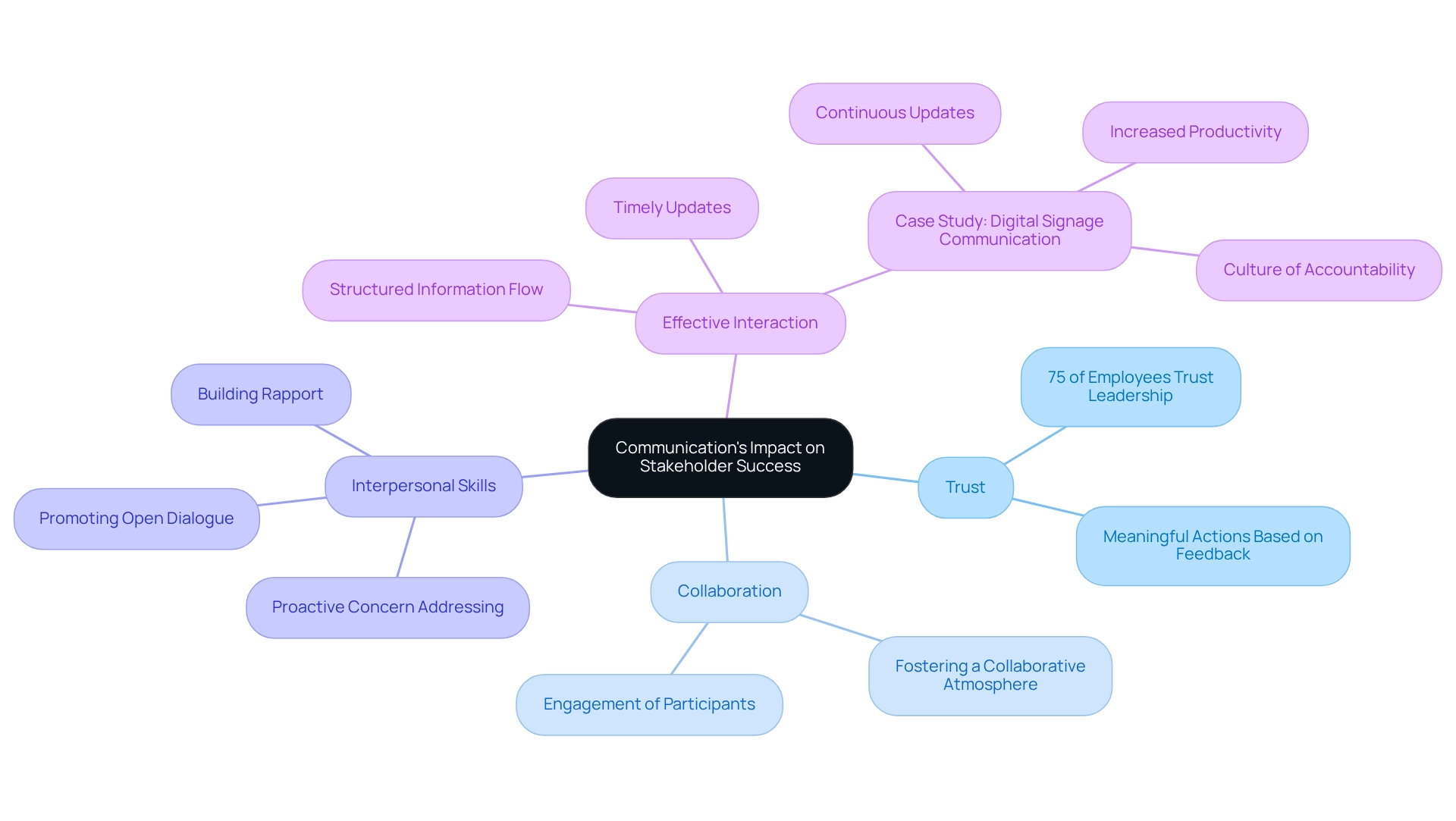
Conclusion
Effective stakeholder management stands as a cornerstone of successful project execution. By systematically identifying and engaging stakeholders, project managers align interests and foster collaboration, leading to enhanced project outcomes. The necessity of clear communication cannot be overstated; it builds trust and facilitates ongoing dialogue, ensuring that stakeholder expectations are met and any potential issues are addressed proactively.
Moreover, the role of interpersonal skills in navigating the complexities of stakeholder relationships has become increasingly critical. Skills such as active listening, empathy, and adaptability empower project managers to connect meaningfully with stakeholders, thereby enhancing the likelihood of project success. As organizations continue to embrace technology, balancing digital tools with human interaction remains essential to maintaining effective stakeholder engagement.
In conclusion, prioritizing effective communication and interpersonal skills is not just beneficial but vital for project success. By fostering an environment where stakeholder needs are recognized and addressed, project managers can create a collaborative atmosphere that drives positive outcomes. As the landscape of project management evolves, those who invest in these fundamental practices will be well-positioned to achieve sustainable growth and build lasting relationships with stakeholders.
Frequently Asked Questions
What is stakeholder oversight and why is it important?
Stakeholder oversight is a strategic process involving the identification, analysis, and engagement of individuals or groups that can influence or be affected by an initiative. It is crucial for achieving success as it ensures alignment among all parties with the initiative's goals and objectives.
What skills are essential for successful project stakeholder management?
Communication and interpersonal skills are essential for successful project stakeholder management. These skills are critical for establishing connections, negotiating expectations, and facilitating constructive dialogue among various parties.
How does participant engagement affect project success?
Initiatives with robust participant engagement strategies are significantly more likely to meet their goals, with success rates increasing by up to 20% when participants are actively involved.
What strategies enhance participant engagement?
Informing sponsors about potential adverse effects and organizing meetings to discuss project goals are essential strategies that enhance participant engagement.
How is technology impacting stakeholder management in 2025?
There is an increasing reliance on technology, such as engagement software, to improve participant management processes, although the value of human interaction remains paramount. AI technologies have limited influence on engagement due to the need for emotional intelligence in interactions.
What is the balance that managers need to strike in stakeholder engagement?
Managers need to balance involvement from interested parties with the isolation of the initiative from external influence to achieve delivery on cost and time while maximizing benefits for clients and associates.
Why is confidentiality important in stakeholder management?
Upholding confidentiality regarding sensitive participant information is crucial for establishing trust and nurturing strong connections, which enhances management efficiency.
What role does effective interaction play in stakeholder engagement?
Effective interaction is vital for successful project stakeholder management as it fosters trust, aligns expectations, and enhances collaboration among participants. It requires active listening and a deep understanding of participant concerns.
What tools can help improve interaction in stakeholder engagement?
Tools designed to streamline meetings for both remote and on-site teams are essential in addressing interaction challenges. Statistics show that emails and live events are effective channels for communication within organizations.
What are the consequences of inadequate interaction in organizations?
Inadequate interaction can lead to confusion and mistrust, ultimately hindering team alignment and performance. Effective dialogue, beginning with leadership, is essential for successful stakeholder engagement.

